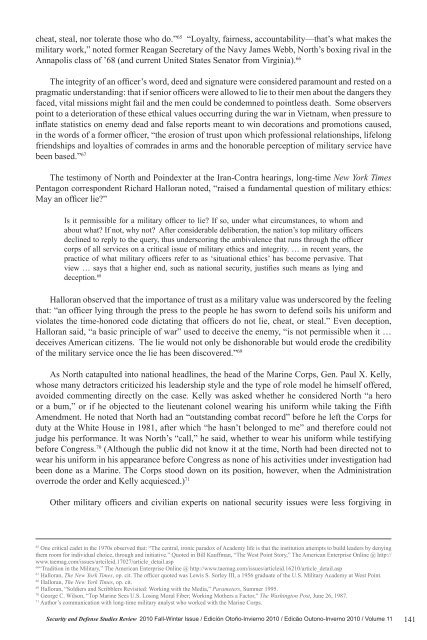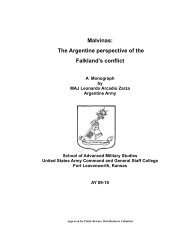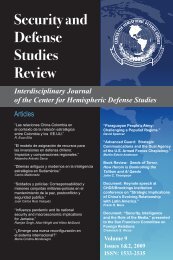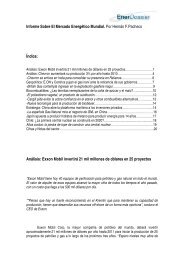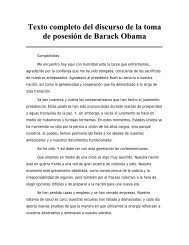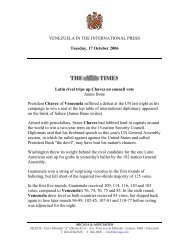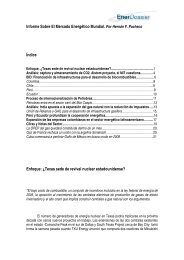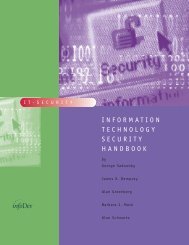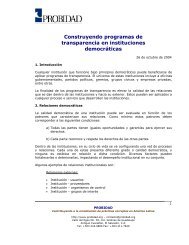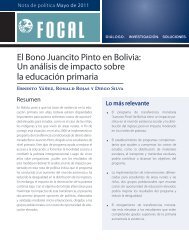secret army alongside skilled profiteers.” 58 McFarlane, who like North served in the Marine Corps inVietnam <strong>and</strong> made him a protégé, “turned North loose in a big way, <strong>and</strong> Poindexter had neither theskill nor the sense to rein him in.” 59 For his part, North “understood the extent to which the WhiteHouse had become hostage to the hostages,” 60 a point that not only underscored their rescue as apresidential priority, but also allowed him to leverage his action-oriented ideas, however implausible<strong>and</strong> un-vetted, into a principal role for himself. Nor was there any doubt about Reagan’s commitmentto the Nicaraguan rebels, who he lionized as “freedom fighters” <strong>and</strong> about whose proxy battle againstthe Soviet-backed Marxist regime, Haig had assured the president, “This is one you can win.” 61THE U.S. MILITARY VIEW of North’s role in Iran-Contra reflected its own traditions <strong>and</strong> codesof conduct, <strong>and</strong> brought to the fore questions about both the lieutenant colonel’s personal ethics <strong>and</strong>his internalization of institutional values. North’s truthfulness <strong>and</strong> discipline became key st<strong>and</strong>ardsupon which he was judged, as was the inversion of military discipline that occurred when Northclaimed to have a better, more comprehensive view of matters of state than his superiors becausehe was closer to them “on the ground.” The way North pushed generals around during meeting bywalking in <strong>and</strong> saying that he spoke for the president became the stuff of legend; his personal foiblenonetheless underscored how often senior military officers could be intimidated by political power.He was, recalled an Air Force colonel who worked with him on Latin America policy from the JointStaff at the Pentagon, “a brash, upstart lieutenant colonel who ignored military protocol <strong>and</strong> calledgeneral officers by their first name” 62The armed forces’ strict subordination to elected authority <strong>and</strong> respect for the rule of law arecornerstones of American democracy. Throughout its history, the U.S. military has been a nondeliberativeinstitution of distinctly conservative culture, maintaining <strong>and</strong> striving to improve valuessuch as leadership, high moral st<strong>and</strong>ards <strong>and</strong> values, <strong>and</strong> discipline, a st<strong>and</strong>ard far higher than thatof mere citizenship expected of all Americans. “The values necessary to defend the society are oftenat odds with the values of society itself,” noted General (ret.) Walter “Dutch” Kerwin, former Armyvice chief of staff. “To be an effective servant of the people, the military must concentrate not onthe values of our liberal society, but on the hard values of the battlefield.” 63 Two political scientistsrecently warned: “The military culture is rightly conservative, observing high st<strong>and</strong>ards, morals, <strong>and</strong>values, any further trend to make the military more like civilian culture would be detrimental to theinstitution’s very existence.” 64“Martial values” include boldness, integrity, honor, courage, commitment, responsibility, <strong>and</strong>intrepidity, as well as loyalty, work ethic, sacrifice, toughness, tradition, example <strong>and</strong> teamwork.The Uniformed Code of Military Justice, which applies to all uniformed personnel within the armedservices, says that all orders of a superior officer must be obeyed by subordinates—unless the orderis unlawful. The honor code of the U.S. Military Academy at West Point states: “A cadet will not lie,58Larry Bensky, “Ollie North: A Soldier for ‘God’s America,’ Los Angeles Times, Nov. 3, 1991.59Cannon, op. cit., p. 627. Poindexter lacked ties to Reagan, political experience <strong>and</strong> knowledge of international relations. “Rarely has such anintelligent <strong>and</strong> unassuming man been so poorly suited for the high position he inherited as Poindexter was as Reagan’s national security adviser,”Reagan biographer Lou Cannon wrote. “Introverted <strong>and</strong> reclusive in his habits … Poindexter was a remote figure even within the NSC … WhenI mentioned … during an interview that even some Republican congressmen had complained about his inaccessibility, he told me that he had noresponsibility for dealing with Congress <strong>and</strong> gave the impression he also had no interest.” More adverse to political process than other of his militarypeers, “This aversion would enable Poindexter to carry out what he believed to be the wishes of his comm<strong>and</strong>er in chief without troubling himself aboutthe legality of his conduct.” His reticence “would enable the venturesome <strong>and</strong> temperamentally opposite Oliver North to gain lock-stock-<strong>and</strong>-barrelcontrol over the many-sided Iran initiative.” Cannon, pp. 625-626.60Cannon, op. cit., pp. 627-628.61Powers, op. cit, p. 396.62Author interview, name withheld by request.63Quoted in John Meroney, “Is the Naval Academy Off Course?” The American Enterprise Online @ http://www.taemag.com/issues/articeid.17028/article_detail.asp64Krista E. Weig<strong>and</strong> <strong>and</strong> David L. Paletz, “The Elite Media <strong>and</strong> the Military-Civilian Culture Gap,” Armed Forces & Society, Vol. 27, No. 2, Winter2001, pp. 193, 196.140<strong>Security</strong> <strong>and</strong> <strong>Defense</strong> <strong>Studies</strong> <strong>Review</strong> <strong>2010</strong> <strong>Fall</strong>-Winter Issue / Edicíón Otoño-Invierno <strong>2010</strong> / Edicão Outono-Inverno <strong>2010</strong> / Volume 11
cheat, steal, nor tolerate those who do.” 65 “Loyalty, fairness, accountability—that’s what makes themilitary work,” noted former Reagan Secretary of the Navy James Webb, North’s boxing rival in theAnnapolis class of ’68 (<strong>and</strong> current United States Senator from Virginia). 66The integrity of an officer’s word, deed <strong>and</strong> signature were considered paramount <strong>and</strong> rested on apragmatic underst<strong>and</strong>ing: that if senior officers were allowed to lie to their men about the dangers theyfaced, vital missions might fail <strong>and</strong> the men could be condemned to pointless death. Some observerspoint to a deterioration of these ethical values occurring during the war in Vietnam, when pressure toinflate statistics on enemy dead <strong>and</strong> false reports meant to win decorations <strong>and</strong> promotions caused,in the words of a former officer, “the erosion of trust upon which professional relationships, lifelongfriendships <strong>and</strong> loyalties of comrades in arms <strong>and</strong> the honorable perception of military service havebeen based.” 67The testimony of North <strong>and</strong> Poindexter at the Iran-Contra hearings, long-time New York TimesPentagon correspondent Richard Halloran noted, “raised a fundamental question of military ethics:May an officer lie?”Is it permissible for a military officer to lie? If so, under what circumstances, to whom <strong>and</strong>about what? If not, why not? After considerable deliberation, the nation’s top military officersdeclined to reply to the query, thus underscoring the ambivalence that runs through the officercorps of all services on a critical issue of military ethics <strong>and</strong> integrity. … in recent years, thepractice of what military officers refer to as ‘situational ethics’ has become pervasive. Thatview … says that a higher end, such as national security, justifies such means as lying <strong>and</strong>deception. 68Halloran observed that the importance of trust as a military value was underscored by the feelingthat: “an officer lying through the press to the people he has sworn to defend soils his uniform <strong>and</strong>violates the time-honored code dictating that officers do not lie, cheat, or steal.” Even deception,Halloran said, “a basic principle of war” used to deceive the enemy, “is not permissible when it …deceives American citizens. The lie would not only be dishonorable but would erode the credibilityof the military service once the lie has been discovered.” 69As North catapulted into national headlines, the head of the Marine Corps, Gen. Paul X. Kelly,whose many detractors criticized his leadership style <strong>and</strong> the type of role model he himself offered,avoided commenting directly on the case. Kelly was asked whether he considered North “a heroor a bum,” or if he objected to the lieutenant colonel wearing his uniform while taking the FifthAmendment. He noted that North had an “outst<strong>and</strong>ing combat record” before he left the Corps forduty at the White House in 1981, after which “he hasn’t belonged to me” <strong>and</strong> therefore could notjudge his performance. It was North’s “call,” he said, whether to wear his uniform while testifyingbefore Congress. 70 (Although the public did not know it at the time, North had been directed not towear his uniform in his appearance before Congress as none of his activities under investigation hadbeen done as a Marine. The Corps stood down on its position, however, when the Administrationoverrode the order <strong>and</strong> Kelly acquiesced.) 71Other military officers <strong>and</strong> civilian experts on national security issues were less forgiving in65One critical cadet in the 1970s observed that: “The central, ironic paradox of Academy life is that the institution attempts to build leaders by denyingthem room for individual choice, through <strong>and</strong> initiative.” Quoted in Bill Kauffman, “The West Point Story,” The American Enterprise Online @ http://www.taemag.com/issues/artcileid.17027/article_detail.asp66“Tradition in the Military,” The American Enterprise Online @ http://www.taemag.com/issues/articleid.16210/article_detail.asp67Halloran, The New York Times, op. cit. The officer quoted was Lewis S. Sorley III, a 1956 graduate of the U.S. Military Academy at West Point.68Halloran, The New York Times, op. cit.69Halloran, “Soldiers <strong>and</strong> Scribblers Revisited: Working with the Media,” Parameters, Summer 1995.70George C. Wilson, “Top Marine Sees U.S. Losing Moral Fiber; Working Mothers a Factor,” The Washington Post, June 26, 1987.71Author’s communication with long-time military analyst who worked with the Marine Corps.<strong>Security</strong> <strong>and</strong> <strong>Defense</strong> <strong>Studies</strong> <strong>Review</strong> <strong>2010</strong> <strong>Fall</strong>-Winter Issue / Edicíón Otoño-Invierno <strong>2010</strong> / Edicão Outono-Inverno <strong>2010</strong> / Volume 11 141
- Page 2 and 3:
Security and Defense Studies Review
- Page 4 and 5:
CommentariesSecurity Cooperation Be
- Page 6:
6Security and Defense Studies Revie
- Page 9 and 10:
El espacio de las mujeres en las Fu
- Page 11 and 12:
La organización e institucionaliza
- Page 14 and 15:
encuentra altamente asociada al cam
- Page 16 and 17:
ministerial para la equidad de gén
- Page 19 and 20:
BibliografíaBarrancos, Dora (2007)
- Page 21 and 22:
Anexo IPaísIncorporación Femenina
- Page 23:
Anexo IIMujeres militares sudameric
- Page 26:
Todo un conjunto de cualidades, cap
- Page 29:
500 y durante la Batalla de Sarand
- Page 32 and 33:
miembros de la soberanía de la Nac
- Page 34 and 35:
10 de octubre de ese año, la Compa
- Page 36 and 37:
algunos barcos de apoyo para alberg
- Page 38 and 39:
1.75 metros de altura y como requis
- Page 40 and 41:
de producción sustituyendo al homb
- Page 42 and 43:
y sicológica, no sólo en los ámb
- Page 44 and 45:
La segunda etapa se caracterizó po
- Page 46 and 47:
Sin embargo, las preguntas acerca d
- Page 48 and 49:
La normativa vinculada con la asign
- Page 50 and 51:
conductas que pudieran encuadrarse
- Page 52 and 53:
Género en el marco de las Operacio
- Page 54 and 55:
ecordar que las ciencias sociales y
- Page 56 and 57:
56Security and Defense Studies Revi
- Page 58 and 59:
De ese modo nos encontramos con mod
- Page 60 and 61:
escala descendente de la oficialida
- Page 62 and 63:
del total. Debe destacarse que dent
- Page 64 and 65:
BibliografíaCarreiras, H.: Gender
- Page 66 and 67:
Tras la aprobación de esta histór
- Page 68 and 69:
Una vez aprobada la Resolución 132
- Page 70 and 71:
para designar asesores de género e
- Page 73 and 74:
firme se ha materializado en la ado
- Page 76 and 77:
la construcción de la paz, la reco
- Page 78 and 79:
Sin embargo, a medida que avanzaba
- Page 81 and 82:
Women on the Front Lines of the Fig
- Page 83 and 84:
term even has meaning any longer wi
- Page 85 and 86:
following graduation. 15 Of course,
- Page 87 and 88:
including members from other Americ
- Page 89 and 90: Solidariedade ou interesse? O que l
- Page 91 and 92: em mais amplo e complexo. 7A possib
- Page 93 and 94: Participação dos Estados-Membros
- Page 95: sujeitos a alguma OMP. Aqueles que,
- Page 98 and 99: às recomendações das Fases II, I
- Page 100 and 101: Franco, que assumira após o Impeac
- Page 102 and 103: O Brasil, por intermédio do Presid
- Page 104 and 105: No entanto, no tocante especificame
- Page 106 and 107: Portanto, não se consegue visualiz
- Page 108 and 109: ReferênciasAlmeida Pinto, J.R. de;
- Page 110 and 111: ______. United Nations Department o
- Page 112 and 113: Beyond economic activities, the PRC
- Page 114 and 115: soy oil into the country, a flow wh
- Page 116 and 117: As is the case with Chinese investm
- Page 118 and 119: In some cases, Chinese companies, l
- Page 120 and 121: Although it is not possible to pred
- Page 122 and 123: Considering this, we will now go fr
- Page 124 and 125: The contribution of Chilean troops
- Page 126 and 127: within and outside the nation?3. Ho
- Page 128 and 129: 128Security and Defense Studies Rev
- Page 130 and 131: 130Security and Defense Studies Rev
- Page 132 and 133: the Iran-Contra affair, one of the
- Page 134 and 135: all American hostages were released
- Page 136 and 137: “As he frequently said with pride
- Page 138 and 139: making operation 48 was conducted s
- Page 142 and 143: public than Kelly, taking issue wit
- Page 144 and 145: Some conservatives, even within the
- Page 146 and 147: opponents that he was “getting pr
- Page 148 and 149: for Defense (SUBDEF)—could initia
- Page 150 and 151: Hence, our countries are showing a
- Page 152 and 153: I am referring to Ibero-American Su
- Page 154 and 155: Thus, our country has agreed to the
- Page 156 and 157: sustraer mi producción intelectual
- Page 158 and 159: hombres (22,288).• Inclusión. Al
- Page 160 and 161: La perspectiva de trabajar en el di
- Page 162 and 163: 162Security and Defense Studies Rev
- Page 164 and 165: assignment on the U.S. Secretary of
- Page 166 and 167: las Operaciones de Paz se abren a u
- Page 168 and 169: ConclusiónA modo de conclusión, u
- Page 170 and 171: 170Security and Defense Studies Rev
- Page 172 and 173: offering insight into political ter
- Page 174 and 175: goods, and skilled labor must all b
- Page 176 and 177: country” like North Korea. To be
- Page 178 and 179: 178Security and Defense Studies Rev
- Page 180 and 181: views of women, in effect disabling
- Page 182 and 183: Marine Col. William T. Hewes’ arg
- Page 184 and 185: 19. Hughes, Melanie M. (2007) “Un
- Page 186 and 187: MacEoin. Commonweal 14: 8-11.This i
- Page 188 and 189: 37. Sans Echaìniz, María. (1992)
- Page 190 and 191:
47. Woodward, Rachel, and Patricia
- Page 192 and 193:
elucidativos das dificuldades que e
- Page 194 and 195:
194Security and Defense Studies Rev
- Page 196 and 197:
of an integrated Canadian company i
- Page 198 and 199:
198Security and Defense Studies Rev
- Page 200 and 201:
stated it would rightfully infringe
- Page 202 and 203:
First, through an examination of de
- Page 204 and 205:
204Security and Defense Studies Rev
- Page 206 and 207:
impact on the reader, by acknowledg
- Page 208 and 209:
To the Editor:Kevin P. Newmeyer’s
- Page 210 and 211:
Whitney Hoft was a Center for Hemis
- Page 212 and 213:
The transformation of the role of w
- Page 214 and 215:
en Puerto Rico, esta soldada resume
- Page 216 and 217:
Deconstruyendo a Ollie: Cómo los c
- Page 218:
Center for Hemispheric Defense Stud


